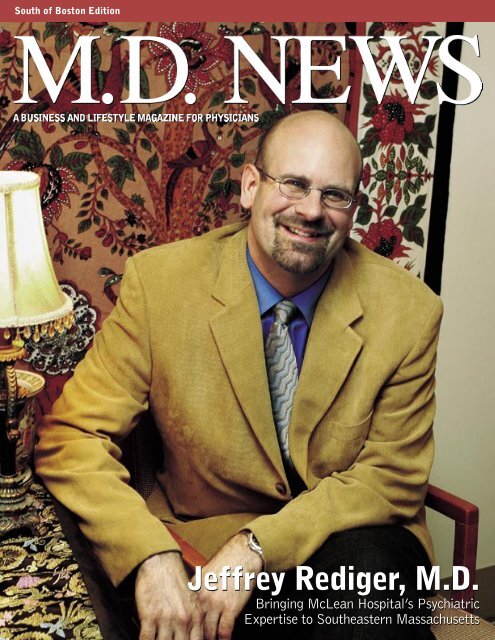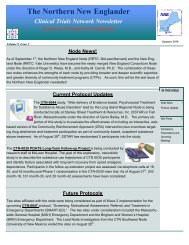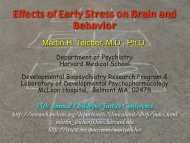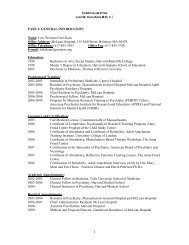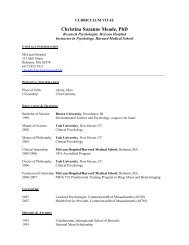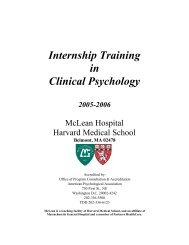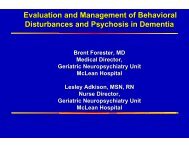Jeffrey Rediger, MD Jeffrey Rediger, MD - McLean Hospital
Jeffrey Rediger, MD Jeffrey Rediger, MD - McLean Hospital
Jeffrey Rediger, MD Jeffrey Rediger, MD - McLean Hospital
You also want an ePaper? Increase the reach of your titles
YUMPU automatically turns print PDFs into web optimized ePapers that Google loves.
South of Boston Edition<strong>Jeffrey</strong> <strong>Rediger</strong>, M.D.Bringing <strong>McLean</strong> <strong>Hospital</strong>’s PsychiatricExpertise to Southeastern Massachusetts
coverstory<strong>McLean</strong> SouthEastWorld-Renowned Psychiatric <strong>Hospital</strong> Brings ItsMental Health Services to Southeastern MassachusettsBy Michael JonesOne in five people in the United States experiences apsychiatric disorder each year.* Very few are likely to bediagnosed, however, due to several factors: the stigma westill attach to any form of mental illness, a lack of resourcesand society’s tendency to reduce too many ailments to theirsimplest physiological level. But as more and more doctorsbecome aware of the way mental health affects the overallphysical health of a patient, the need for top-quality mentalhealth services becomes greater than ever.Since its inception in 1811, <strong>McLean</strong> <strong>Hospital</strong>, an affiliateof Harvard Medical School located on a sprawling campusin Belmont, MA, has been considered one of the world’spremier psychiatric hospitals — a leader in patient care,neuroscience research and professional education. In recentyears, in its efforts to adapt its services to the changing needsof its patients, the hospital has also become more accessibleto new communities. In the 1990s, when the hospital realizedthat a large share of its patients were coming from therapidly growing region of southeastern Massachusetts, itembarked on a plan to open its first satellite inpatient facilityin Plymouth.“Rather than having patients from southeastern Massachusettsand Cape Cod trek through Boston to Belmont, we brought<strong>McLean</strong>’s resources to them,” recalls Richard Silva, <strong>McLean</strong>SouthEast’s provider relations manager.The program has been a huge success from the day it openedin 1999; so much so, that in early 2004 <strong>McLean</strong> SouthEastmoved from its original 15-bed location in Plymouth to a largerfacility that <strong>McLean</strong> leases on the grounds of the VeteransAffairs Medical Center in Brockton.Source* Mental Health: A Report of the Surgeon General, 1999.<strong>McLean</strong>SouthEasthas been sosuccessful thatit had to movefrom its originalPlymouthlocation to alarger facilityon the campusof the VA<strong>Hospital</strong> inBrockton.PHOTOGAPHER: DEBRA TROYANOS
<strong>Jeffrey</strong> <strong>Rediger</strong>, M.D., the medical director for <strong>McLean</strong>SouthEast, oversees the 25-bed adult unit and partialhospital. <strong>McLean</strong> SouthEast also has an AdolescentResidential Treatment Program on-site. These clinicalservices provide evaluation and treatment of both acuteand chronic psychiatric illness. Dr. <strong>Rediger</strong> and his colleaguescomprise a multidisciplinary team that offers careto both adults and adolescents.A seminarian before he entered medical school, Dr. <strong>Rediger</strong>has the air of a man who is at peace with himself and the worldaround him. He is particularly interested in the way othercultures regard and treat mental illnesses. He believes that theculture of the United States is one that contributes to a dramaticincrease in mental illness as people try and keep up witha rapidly changing world.“We have a strong value of self-determination in this country,”he says. “We’ve linked that to individualism in a waythat means people’s lives are far more fragmented than theywere 50 years ago. People don’t often live in the same townthey grew up in. They don’t live near their families. Theirjobs change multiple times throughouttheir career. People don’t have a broadunderstanding of the world they live inor who they are. It’s very hard to seethe large picture any more.”Dr. <strong>Rediger</strong> says that the fragmentednature of today’s society has an especiallyharmful effect on people withpsychiatric illnesses such as depression,anxiety and schizophrenia.“Research has shown that individualswith schizophrenia do worse in culturesthat are fragmented externally,”he says.An important component of <strong>McLean</strong>SouthEast’s services is a Day Program,or Partial <strong>Hospital</strong>ization Program,PHOTOGAPHER: DEBRA TROYANOS<strong>Jeffrey</strong> <strong>Rediger</strong>, M.D. is the medical director for <strong>McLean</strong> SouthEast.We’re very user-friendlyfor the primary carecommunity, and focused onthat goal.Dr. <strong>Rediger</strong>that provides patients with a similarlevel of care they would have duringan inpatient stay, but allows them toreturn home at the end of the day,provided their home environment isstable. Patients can acquire the supportthey need from group sessions, individualcounseling and psychiatric therapythen, at the end of the day, practicewhat they have learned at home.“Our Partial <strong>Hospital</strong>ization Programis very important, and that’s whythere is significant demand to increaseour capacity,” says Dr. <strong>Rediger</strong>. “It is
a place where people can be referred by their primary carephysician, be seen immediately, be stabilized and when ready,are transferred to outpatient treatment.”<strong>McLean</strong> SouthEast is often able to provide referrals toindividuals for outpatient treatment more quickly thanmost primary care providers, Dr. <strong>Rediger</strong> says. Throughnormal referral channels, it can often take up to two monthsOur Partial <strong>Hospital</strong>ization Program is very important,and that’s why there is significant demand to increaseour capacity. It is a place where people can be referredby their primary care physicians, be seen immediately,be stabilized, then transferred to outpatient treatment.Dr. <strong>Rediger</strong>for a patient to be seen by a psychiatrist. Patients referredthrough the <strong>McLean</strong> SouthEast network rarely wait morethan two weeks.“It’s a constant frustration of many primary care doctors,”says Dr. <strong>Rediger</strong>. “Providing timely access to outpatient careis an important part of what we do. Patients directly benefitfrom the efficiency and support they receive here.”Partial hospitalization has allowed <strong>McLean</strong> SouthEast torespond to a major shift in the way the mentally ill have beencared for over the past two decades. From the 1980s to early1990s, typical lengths of stay for psychiatric inpatients werefrom 30 to 60 days. With the advent of managed care, staysof four to seven days have become the norm.Establishing strong links to the primary care communityhas been key to the success of <strong>McLean</strong> SouthEast. Primarycare providers are often on the front line of what can bea frustrating experience — obtaining treatment for theirpatients’ mental illness.“An estimated 50 percent of primary care patient complaintswill have a psychological or psychiatric componentto their illness,” says Dr. <strong>Rediger</strong>. “People will arrive at thedoorstep of their primary care provider and report seriousconcerns, such as a back pain, headache, sleeplessness or depression.The primary care doctor then has an overwhelmingtask of identifying and treating a condition that, at least halfthe time, does not have a physiological basis.”Dr. <strong>Rediger</strong> hopes that primary care doctors and othermedical specialists alike will become more aware of thebenefits of the programs that <strong>McLean</strong> SouthEast offers.Substance abuse plays a major role in many of the patientsthat Dr. <strong>Rediger</strong> sees. Up to 75 percent of adults admittedto psychiatric care have a substance abuse component totheir condition.“<strong>McLean</strong> SouthEast has two treatment tracks,” he says.“One is geared towards those who are suffering from overwhelminglife problems and psychiatric illness, and the otherfocuses on treatment of individuals who have a combinationof substance abuse and mental illness.”Dr. <strong>Rediger</strong> says that often the firsthurdle patients must overcome onboth tracks is confronting their denial.“A person will come into the hospitalbecause his or her problems have gottenthem into trouble. Initially, it’s notat all uncommon that people do notwant to look at the contribution thatnegative behavior, heroin, cocaine oralcohol, is making to their lives,” hesays. “Our staff does an outstanding job of helping peoplebegin to look at these underlying problems.”Just outside the adult unit at <strong>McLean</strong> SouthEast is the AdolescentAcute Residential Treatment (ART) Program. Here,teenagers, ages 13 to 19, many of whom are discharged frominpatient hospitals, learn strategies that can help them avoidfuture hospitalizations. The ART offers a rich therapeuticenvironment, one that emphasizes skills development andprovides patients with ample opportunities to make personaldecisions on how they choose to behave.<strong>McLean</strong>’s involvement in the community extends beyondits own doors. Staff members also work in emergency roomsat Jordan <strong>Hospital</strong> in Plymouth and Winchester <strong>Hospital</strong>,providing further assurance for primary care physicians thatpsychiatric triage is available to their patients 24 hours a day,seven days a week.“We’re very user-friendly for the primary care community,and focused on that goal. We want to make it as easy as possiblefor primary care physicians to access treatment for theirpatients. That’s why we’re here,” says Dr. <strong>Rediger</strong>. ■<strong>McLean</strong> <strong>Hospital</strong>115 Mill StreetBelmont, MA 02478www.mclean.harvard.edu/mse1.800.333.0338An affiliate of HarvardMedical School andMassachusetts General<strong>Hospital</strong> and a member ofPartners HealthCare.


